|
|
|
Sort Order |
|
|
|
Items / Page
|
|
|
|
|
|
|
| Srl | Item |
| 1 |
ID:
109542
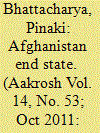

|
|
|
| 2 |
ID:
096688
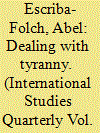

|
|
|
|
|
| Publication |
2010.
|
| Summary/Abstract |
This paper examines whether economic sanctions destabilize authoritarian rulers. We argue that the effect of sanctions is mediated by the type of authoritarian regime against which sanctions are imposed. Because personalist regimes and monarchies are more sensitive to the loss of external sources of revenue (such as foreign aid and taxes on trade) to fund patronage, rulers in these regimes are more likely to be destabilized by sanctions than leaders in other types of regimes. In contrast, when dominant single-party and military regimes are subject to sanctions, they increase their tax revenues and reallocate their expenditures to increase their levels of cooptation and repression. Using data on sanction episodes and authoritarian regimes from 1960 to 1997 and selection-corrected survival models, we test whether sanctions destabilize authoritarian rulers in different types of regimes. We find that personalist dictators are more vulnerable to foreign pressure than other types of dictators. We also analyze the modes of authoritarian leader exit and find that sanctions increase the likelihood of a regular and an irregular change of ruler, such as a coup, in personalist regimes. In single-party and military regimes, however, sanctions have little effect on leadership stability.
|
|
|
|
|
|
|
|
|
|
|
|
|
|
|
|
| 3 |
ID:
187623
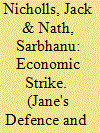

|
|
|
| 4 |
ID:
134081
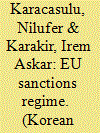

|
|
|
|
|
| Publication |
2014.
|
| Summary/Abstract |
Although there is enormous discussion on normative power Europe, there is relatively less focus on the EU sanctions regime, though sanctions have become a useful foreign policy tool as the EU has applied sanctions within the framework of the Common Foreign and Security Policy. Looking at the literature, Kreutz focused on the EU sanctions regime in the time period of 1981-2004, during which sanctions
were used to accomplish normative goals. Yet, later on Brummer argued that although norms and values still play a role in the EU's sanctions regime, more often they were surpassed by security and economic interests. This article examines the previous work on the EU sanctions regime and tries to comprehend why the use of sanctions has increased over time as well as whether they have been "selectively" used. In addition, the article analyzes whether the normative commitment is crucial in the construction of the EU sanctions regime. The EU sanctions regime toward Iran is analyzed in particular, because as indicated by Santini and Tabrizi, Iran is the first country against which the EU has developed a new strategy out of weapons of mass destruction concerns, starting in 2006. Since 2010, EU foreign ministers have adopted tougher sanctions in an effort to block its controversial nuclear program. Recently, the Iran nuclear deal of November 2013 was interpreted as attributable to sanctions against Iran, in which EU sanctions have constituted a remarkable role, have proven effective.
|
|
|
|
|
|
|
|
|
|
|
|
|
|
|
|
| 5 |
ID:
131569
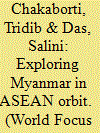

|
|
|
|
|
| Publication |
2014.
|
| Summary/Abstract |
In recent years, the changing power dynamics of the past military rulers to civilian way of functioning has raised number of questions in the discourse of international politics. This shift of power structure has evolved on account of a number of important factors; the autocratic rule of the military junta, the absence of democratic norms, violation of Human Rights, followed by under development on account of international sanctions, pressure from the Western world to follow democratic norms, the inclusion of Myanmar into ASEAN and the pressure of the latter on the former to establish democracy, remains the prime reason for the weak economic development. The shifting paradigm of military rulers to civilian government since 2011 followed by the entry of various actors like USA, India, Japan, and China shifted the entire gamut to a different direction. This article will highlight the role of ASEAN over the years with reference to Myanmar's new government and assess the implication in India.
|
|
|
|
|
|
|
|
|
|
|
|
|
|
|
|
| 6 |
ID:
192493
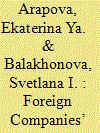

|
|
|
|
|
| Summary/Abstract |
This study aims to assess the scale of foreign companies’ withdrawal from
the Russian market after the start of the Special Military Operation in
Ukraine as well as the possibility of replacing them with counterparties
from jurisdictions that have not joined anti-Russian sanctions. Expert
assessments are based on the original database on foreign business
behavior compiled by the Institute for International Studies at the
Russian Foreign Ministry’s MGIMO University. The analysis shows that
relatively small foreign companies are leaving the Russian market, while
large international corporations are scaling back their operations in
Russia and are more inclined to adapt to the new conditions. The negative
impact on the Russian economy as a whole appears to be not as big
as the assessment based on the Yale Database of foreign companies
would suggest. The Russian IT sector, the business services sector,
and the financial sector have expectedly proved to be relatively more
vulnerable. At the same time, the natural resources sector (power and
mining industries) is relatively more stable, and cooperation with state-
owned (or state-affiliated) companies in jurisdictions that do not support
sanctions against Russia has the best prospects.
|
|
|
|
|
|
|
|
|
|
|
|
|
|
|
|
| 7 |
ID:
129932
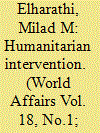

|
|
|
|
|
| Publication |
2014.
|
| Summary/Abstract |
While it is evident that NATO played a major military role in the Libyan insurrection, Milad M Elharathi analyses the reasons for its intervention and why it did not take similar action in Tunisia or Egypt. He also investigates whether the organisation succeeded in its alleged goals to establish democracy and stability in Libya.
|
|
|
|
|
|
|
|
|
|
|
|
|
|
|
|
| 8 |
ID:
144655
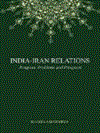

|
|
|
|
|
| Publication |
New Delhi, KW Publishers Pvt Ltd, 2016.
|
| Description |
xiv, 417p.: tables, figures, mapshbk
|
| Standard Number |
9789383649761
|
|
|
|
|
|
|
|
|
|
|
|
Copies: C:1/I:0,R:0,Q:0
Circulation
| Accession# | Call# | Current Location | Status | Policy | Location |
| 058635 | 327.54055/ASH 058635 | Main | On Shelf | General | |
|
|
|
|
| 9 |
ID:
189200
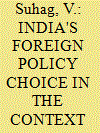

|
|
|
|
|
| Summary/Abstract |
SINCE 2014, relations between the US and its allies, on the one hand, and the Russian Federation, on the other, have deteriorated over the incorporation of Crimea into Russia, which led to sanctions being placed on Russia, as well as on third countries interacting with Russia in areas subject to sanctions. Acase in point is the Countering America's Adversaries Through Sanctions Act (CAATSA). The US Senate drew attention to a deal that India had signed with Russia to buy a batch of S-400 [surface-to-air missile] systems from [state-run arms exporter] Rosoboronexport, a Russian military organization that was included on the sanctions list. In 2018, sanctions were also imposed on China under CAATSA for similar cooperation with Russia.
|
|
|
|
|
|
|
|
|
|
|
|
|
|
|
|
| 10 |
ID:
056145
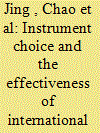

|
|
|
| 11 |
ID:
142433
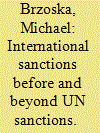

|
|
|
|
|
| Summary/Abstract |
United Nations sanctions are authorized by the international body that is legally charged with the maintenance of international peace and security, the UN Security Council. They are grounded in provisions of the UN Charter. However, only a fraction of all international sanctions are mandated by the UN. One of the findings of this article, which is based on data collected by the Targeted Sanctions Consortium (TSC), is that the large majority of UN sanctions are preceded by non-UN sanctions, particularly sanctions by the United States and the European Union. Furthermore, it is common practice, particularly by the US and the EU, to add sanction provisions of their own to UN sanctions. As a result, for most UN sanctions, there are also non-UN sanctions against the same targets. Such combined sanction regimes add restrictions imposed by only some governments to those that all countries have to implement. Combined sanction regimes are therefore potentially more effective in achieving the targeted outcome than UN sanctions, which represent the lowest common denominator achievable among the members of the UN Security Council. On the other hand, combined sanction regimes might suffer from a type of ‘sanctions fatigue’. A growing number of states outside of the West are openly opposed to unilateral sanctions. Adding non-UN sanctions to UN sanctions might reduce their willingness to support UN sanctions. The TSC data, however, does not support such a contention. Rather, the data indicates that combined sanction regimes are more effective than stand-alone UN sanctions. Still, the US and EU governments—as the main drivers of sanctions policy in general and UN sanctions in particular—need to be aware of this criticism in order not to unwittingly undermine the UN sanctions instrument.
|
|
|
|
|
|
|
|
|
|
|
|
|
|
|
|
| 12 |
ID:
111155
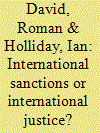

|
|
|
|
|
| Publication |
2012.
|
| Summary/Abstract |
International sanctions, which commonly seek to engineer target state compliance with human rights norms, often fail to deliver on their objectives. In recent years, however, a fresh approach has emerged through the rise of international justice, which can act as either a complement or an alternative to sanctions. In this article, the authors develop three hypotheses. Political change will be facilitated by: (1) lifting sanctions; (2) guarantees of non-prosecution; or (3) lifting sanctions combined with guarantees of non-prosecution. The authors test the hypotheses on Myanmar, a country that has long been subject to international sanctions, but that has rarely complied with human rights norms. Myanmar is also situated in a region where international justice is currently being applied through prosecution of former Khmer Rouge leaders in Cambodia. The authors' test was undertaken in June 2010 through a vignette-based expert survey that manipulated international sanctions, international justice and their absence in a 2 x 2 factorial design. The findings point to the need for a consistent approach. Lifting sanctions and guarantees of non-prosecution, when applied in tandem, are thought likely to promote political change. At the other extreme, imposing sanctions and prosecuting state leaders, when done together, are also viewed as facilitators of political change, though support is considerably smaller.
|
|
|
|
|
|
|
|
|
|
|
|
|
|
|
|
| 13 |
ID:
115390
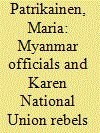

|
|
|
| 14 |
ID:
120866
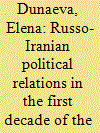

|
|
|
|
|
| Publication |
2013.
|
| Summary/Abstract |
In the 1990s, Russia and Iran successfully laid the foundations for interaction and expanded their spheres of cooperation. At the beginning of the twenty-first century, their relations developed unevenly. These fluctuations depended on the combination of global and regional factors, as well as on the internal circumstances in each country. Russia's participation in international sanctions has aroused discontent in Iran. Despite this, the political establishments of both countries continue to demonstrate an interest in developing bilateral relations and to reaffirm their shared geopolitical interests. This paper analyzes foreign policy documents and the latest research by Russian and Iranian scholars. It strives to shed light on the question: "To what extent and in what areas do the interests of Russia and Iran coincide, and what is the foundation for their potential future development?"
|
|
|
|
|
|
|
|
|
|
|
|
|
|
|
|
| 15 |
ID:
148370
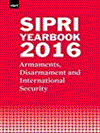

|
|
|
|
|
| Publication |
Oxford, Oxford University Press, 2016.
|
| Description |
xxx, 858p.hbk
|
| Standard Number |
9780198787280
|
|
|
|
|
|
|
|
|
|
|
|
Copies: C:1/I:0,R:0,Q:0
Circulation
| Accession# | Call# | Current Location | Status | Policy | Location |
| 058851 | 327.17405/SIP 058851 | Main | On Shelf | General | |
|
|
|
|
| 16 |
ID:
157652
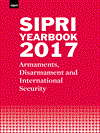

|
|
|
|
|
| Publication |
Oxford, Oxford University Press, 2017.
|
| Description |
xxv, 744p.hbk
|
| Standard Number |
9780198811800
|
|
|
|
|
|
|
|
|
|
|
|
Copies: C:1/I:0,R:0,Q:0
Circulation
| Accession# | Call# | Current Location | Status | Policy | Location |
| 059317 | 327.17405/SIP 059317 | Main | On Shelf | General | |
|
|
|
|
| 17 |
ID:
129328
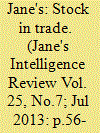

|
|
|
| 18 |
ID:
157433
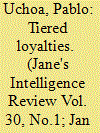

|
|
|
| 19 |
ID:
123541
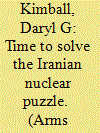

|
|
|
| 20 |
ID:
149701
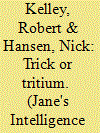

|
|
|
|
|
| Summary/Abstract |
As North Korea contiunes to defy international sanctions and develop its nuclear weapons programme, Robert Kelley and Nick Hansen examine the Yongbyon Atomic Energy Research Centre's potential to support the programme's advancement.
|
|
|
|
|
|
|
|
|
|
|
|
|
|
|
|
|
|
|
|
|